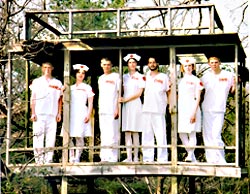If there were an indie-rock playbook on how not to reach the mainstream—er, the Showbox—when you’ve already got a sound that could be described as adenoidal Christian emo, it would advise being photographed with schizo-genius Daniel Johnston, which pretty much guarantees permanent fringe status as an alterna- alternative musical figure. Johnston already has his own rock-doc paean to eccentricity, The Devil and Daniel Johnston. This one might be titled The Deity and Daniel Smith, since the founder of the Danielson Famile—his spelling, not ours—is a committed Christian and outsider artist whose work has been shown as far from his South Jersey home as, well, Brooklyn. “The creative process and the Creator go hand in hand,” says the cheerful and decidedly nondogmatic Smith, who enlisted his four siblings into his band in the mid-’90s, when his youngest brother was all of 11.
Dressed in white nurse outfits to symbolize the healing power of the Lord, augmented by various spouses and friends (including a pre-fame Sufjan Stevens), the Famile would get booed off the stage at any respectable suburban megachurch. They are not radio-ready Christian rockers. For this reason, hipsters at the Knitting Factory and elsewhere have half-embraced their nonironic sound, a nakedly affirmative collage of xylophones, violins, and mewing, keening choruses that are less overtly religious than your average R&B single. The self-taught musicianship, costumes, and choreography make the Famile triumphantly, indisputably DIY; fans praise their authenticity, of course, even while puzzling over their inspiration. (There are Seattle notes, too, in the Famile story: Local label Tooth & Nail first signed the band; local shoesmith John Fluevog specially designed the white, heart-adorned “Familevog” model for them; and member Chris Palladino once lived here.)
Since there can be no Behind the Music–style backstage debauchery here (“Hey, quit praying with my Bible!”), the only narrative impetus director J.L. Aronson can apply to this bland, loving clan is that of rivalry between Smith and his protégé. Trying to establish a solo act circa 2003 while wearing a tree costume (see indie-rock playbook, above), Smith is thoroughly upstaged by the opening set of Stevens, whose melodic gifts, less exuberant spirituality, and more conventional singing voice immediately mark him as the star that Seven Swans would make him.
But that’s a different documentary. This one leaves Smith in the basement of his parents’ home, a devoted husband and father, twiddling the dials on home- recording projects destined not to outsell Illinoise. Maybe it’s not the life of a rock star, but not every rock star has the contentment of a calling. BRIAN MILLER








